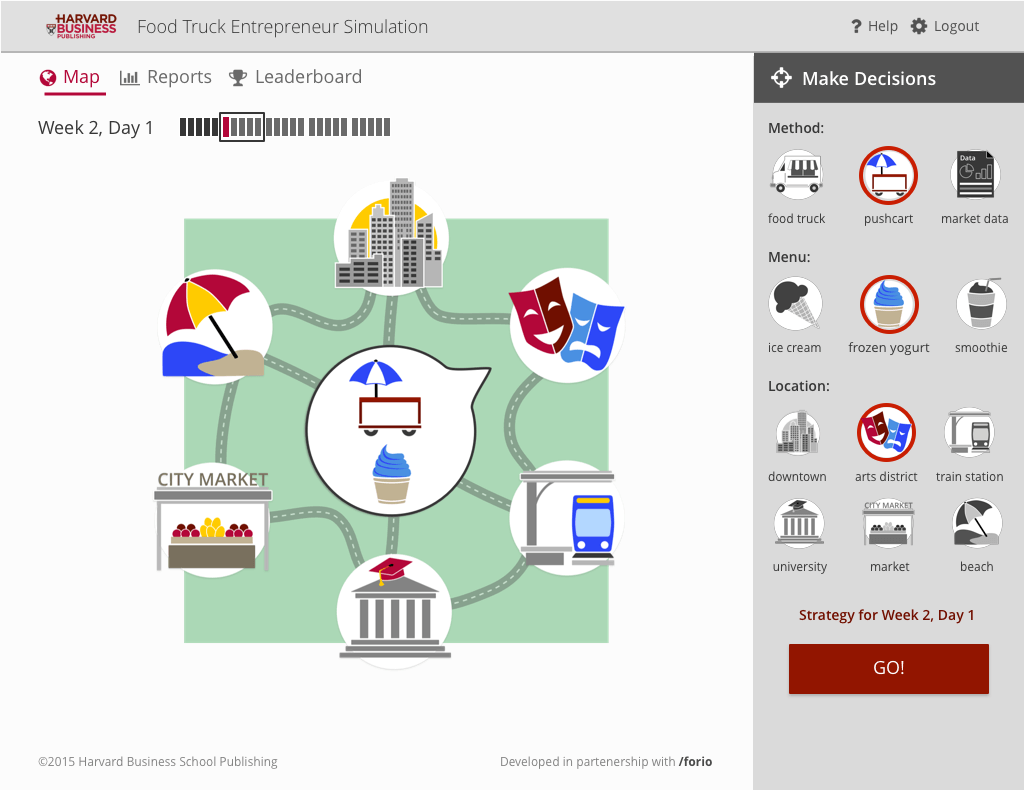Entrepreneurship games have greatly expanded in recent years, providing plenty of options for individuals to develop their business acumen while having fun. A good entrepreneurship game can teach you the ins and outs of starting and managing a business and improve your decision-making skills, all in a highly engaging environment.
See Also: What Can Young Entrepreneurs Learn from the Game of Basketball
In this article, we will share our top 6 entrepreneurship games, their unique features, and our favorite aspects of each game.
1. Products: The Card Game
Products: The Card Game by skypig is the brainchild of a visionary brand committed to igniting entrepreneurial spirit. While this inventive and humorous pitch-it, invent-it card game is a game first and foremost, it’s also a platform for learning inventing skills, backed by research from MIT, UI, and more.
Crafted to enhance creativity and foster your best pitching skills, Products prompts players to create ingenious or hilariously disastrous products, and present them to friends and family. The game has been mentioned in publications such as Due, Entrepreneur, Nasdaq, and more.
Our favorite part: Products: The Card Game isn’t education pretending to be a game—it’s a blast! It drives players into the inventive process, effortlessly fostering creativity and innovation. While having a ton of fun, the game sneaks in lessons on how to pitch without you even realizing you’re learning. Its smooth fusion of entertainment and education makes Products an ideal pick for individuals, teams, or students looking for an enjoyable and effective way to learn and master the art of invention.
2. The Startup Game
The Startup Game is a board game specifically aimed at teaching entrepreneur wannabes how to build and grow their startups. Players engage in realistic business scenarios, developing strategies, making critical decisions, and measuring outcomes. This interactive board game follows the entire entrepreneurial journey.
Our favorite part: The Startup Game provides a dynamic learning environment while keeping it engaging. The game is regularly updated with current market trends and events to make players adapt and learn how the real business world operates.
3. Cashflow 101
Created by Robert Kiyosaki, the author of the best-selling book “Rich Dad Poor Dad,” Cashflow 101 is a classic educational board game that helps players understand the importance of money management and financial freedom. Spurred by Kiyosaki’s principles, players must buy cash flow-generating assets and learn how to minimize liabilities to escape the rat race and achieve financial freedom.
Our favorite part: Cashflow 101 is an excellent game to teach players basic financial literacy, as well as providing a practical understanding of the potential for intelligent investments. The game fosters learning by allowing players to make mistakes and refining their risk-assessment and decision-making abilities.
4. BizTown

BizTown is an online simulation game designed to teach students about entrepreneurship, financial management, and critical thinking. Players are immersed in running a business, taking responsibility for finances, sales, and marketing in a virtual environment, simulating real-world business scenarios.
Our favorite part: BizTown is highly interactive and accessible, providing a hands-on learning experience for young entrepreneurs or students interested in the business world. The game is designed to be engaging and informative while still providing a solid grounding in business basics.
See also: 8 Daily Habits of Successful People
5. Food Truck Challenge

Food Truck Challenge is a board game that challenges players to compete at owning and operating a food truck. Players must manage their finances, choose ingredients, develop recipes, and cater to customer preferences while competing for space on the food truck scene.
Our favorite part: The Food Truck Challenge provides practical insights into running a small business, incorporating elements like working with a limited budget and managing customer satisfaction. The game is enjoyable and competitive, effectively capturing the essence of entrepreneurship.
6. The Game of Life: Quarter Life Crisis

This version of the iconic Game of Life board game highlights the critical aspects of financial management, career choices, and balancing life demands. Players must navigate the twists and turns of life’s uncertainties, using wise decision-making skills to advance on the board and achieve a successful lifestyle.
Our favorite part: The Game of Life Quarter Life Crisis, introduces a modern, relatable struggle into a classic board game format. The game helps players appreciate the importance of making sound decisions and provides an entertaining experience that anyone can enjoy.
What exactly are entrepreneurship games?
Entrepreneurship games explore business skills. They are designed to teach and inspire budding entrepreneurs.
For example, games like Startup Tycoon and Restaurant Empire simulate natural business environments, allowing participants to practice managing finances, making critical decisions, and solving problems. These experiences showcase the challenges an entrepreneur may face.
Games like Lemonade Stand and Cashflow 101 also focus on specific business concepts, such as budgeting and understanding cash flow. This exposes players to essential entrepreneurship principles.
Ultimately, these games cultivate valuable business capabilities.
Are entrepreneurship games important?
Entrepreneurship games matter. They foster vital business skills. As players navigate complex scenarios, they learn problem-solving, critical thinking, and resource management. These skills translate to real-world business success.
Additionally, they encourage creativity and innovation. Players must adapt to changing markets and develop unique strategies, stimulating their entrepreneurial instincts.
Ultimately, these games build confidence and understanding in aspiring entrepreneurs.
What are things to look for in entrepreneurship games?
Here are a few things to look for:
- Gameplay
- Scope of the game
- User interface
- Strong community support
Gameplay
Evaluating gameplay is vital in entrepreneurship games. It helps players understand crucial aspects of running a business. Consider the game’s engagement and realism, which ensures players develop relevant skills. For instance, games featuring challenging economic simulations or well-designed decision-making consequences provide immersive experiences. These experiences are essential as they encourage the development of entrepreneurial skills like problem-solving and decision-making.
Scope
Another factor is the scope of the game. It should accurately represent the various stages of entrepreneurship, from ideation to expansion. Comprehensive games might cover team building, fundraising, and marketing strategy. This diversity of elements helps players become more adaptable when facing real-life business challenges. Moreover, comprehensive games offer valuable insights for those interested in pursuing entrepreneurship, allowing them to test their abilities in a safe environment.
User interface
A game’s user interface should also be considered, as it enhances the overall experience. Simple and intuitive controls enable users to focus on developing entrepreneurial skills and strategies rather than struggling to navigate through unclear menus. User-friendly games are more likely to be enjoyed and recommended to others, meaning well-designed games can facilitate greater learning experiences for aspiring entrepreneurs.
Community
Lastly, strong support and an online community are also essential. A game encouraging collaboration and discussion among players promotes shared learning, which is essential for entrepreneurial success. For example, forums or chat features offer opportunities to discuss strategies, learn from mistakes, and celebrate achievements. A strong community encourages motivation and enthusiasm, fostering continued skill development and a better understanding of entrepreneurship.
By keeping these aspects in mind, one can make an informed decision when selecting the best entrepreneurship games for their needs, ultimately enhancing their business knowledge and skills while simultaneously enjoying the experience.
FAQs
1. What are entrepreneurship games?
Entrepreneurship games are immersive experiences designed to teach and inspire budding entrepreneurs. They simulate real-world business environments, allowing participants to practice managing finances, making critical decisions, and solving problems. These games showcase the challenges entrepreneurs may face, promoting the development of essential business skills.
2. Why are entrepreneurship games important?
Entrepreneurship games are crucial for fostering vital business skills. As players navigate complex scenarios, they learn problem-solving, critical thinking, and resource management, translating these skills to real-world business success. Additionally, these games encourage creativity and innovation, helping players adapt to changing markets and develop unique strategies. Ultimately, entrepreneurship games build confidence and understanding in aspiring entrepreneurs.
3. What should one look for in entrepreneurship games?
When evaluating entrepreneurship games, consider the following factors:
- Gameplay: Assess the engagement and realism of the game to ensure players develop relevant skills, such as problem-solving and decision-making.
- Scope: Look for games that accurately represent various stages of entrepreneurship, covering aspects from ideation to expansion. Comprehensive games offer valuable insights and test abilities in a safe environment.
- User Interface: Choose games with a simple and intuitive user interface to enhance the overall experience. Well-designed controls allow users to focus on developing entrepreneurial skills without struggling with unclear menus.
- Community Support: Strong community support, including forums or chat features, encourages collaboration and discussion among players. A robust community promotes shared learning, motivation, and enthusiasm for continued skill development.
By considering these aspects, individuals can make informed decisions when selecting entrepreneurship games, enhancing their business knowledge and skills while enjoying an immersive gaming experience.
4. How do entrepreneurship games contribute to skill development?
Entrepreneurship games contribute to skill development by offering dynamic interactions and challenges that simulate real-world business scenarios. Players engage in decision-making, financial management, and problem-solving, honing essential entrepreneurial skills. The hands-on experiences provided by these games foster adaptability, creativity, and a deeper understanding of the complexities of entrepreneurship, preparing individuals for success in the business world.
5. Are there different types of entrepreneurship games?
Yes, various types of entrepreneurship games cater to different preferences and learning styles. Some are board games, like “The Startup Game” and “Cashflow 101,” while others are card games, such as “Products.”
Each type offers a unique gaming experience, allowing individuals to choose the format that best suits their interests and preferences. Whether through strategic board games or interactive online simulations, there’s an entrepreneurship game for everyone to enjoy and learn from.
Conclusion:
Entrepreneurship games are fun and provide significant learning experiences that impart crucial skills to budding entrepreneurs. Through dynamic interactions and challenges, these games help players understand the essentials of financial management, decision-making, and overall business acumen. With options ranging from board games to online simulations, there is an entrepreneurship game for everyone to enjoy and learn from. Happy gaming!









